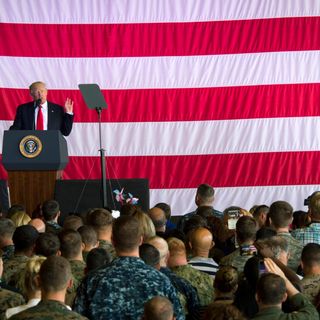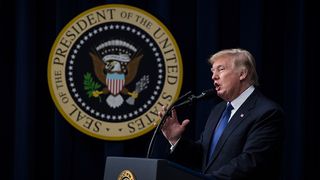There were significant threats to the security of Australia and the United States before Donald Trump was elected US President.
North Korea's nuclear ambitions are decades old, and China's militarisation of the South China Sea began several years ago. Russia's encroachments in Ukraine, the Syrian conflict and ISIS all predate Mr Trump.
Many see the world as more dangerous precisely because the United States is perceived to be weaker under Mr Trump
But one year into the Trump administration, Australians and Americans feel the world is more dangerous and that a weaker United States is less well-placed to deal with security threats.
Moreover, Mr Trump's presidency appears to be exposing fault lines in Australian public opinion around the value of the US-Australia relationship.
Both countries think America is weaker
Recent polling by the United States Studies Centre (USSC) and YouGov — surveying both Australians and Americans — gives mixed grades on American strength after the first year of Mr Trump's presidency. Perceptions of American strength and international security are closely linked for large portions of the publics in both countries — with some interesting exceptions. Our data suggest that many see the world as more dangerous precisely because the United States is perceived to be weaker under Mr Trump.
Only 19 per cent of Australians think America has grown stronger over the first year of the Trump presidency.
Public opinion on Donald Trump and perceptions of security in Australia and the United States

Americans are less dour in their assessments, with 36 per cent saying that the United States has become weaker over the last year. "Weaker" leads "stronger" by 27 points in the Australian data, but this difference is just six points among Americans.
Views divided along party lines
Democrats and Republicans disagree profoundly on many things — a trend that long predates Mr Trump, but has attained unprecedented levels under his presidency.
Assessments of the trajectory of American power under Mr Trump are no exception: 72 per cent of Democrats but just 7 per cent of Republicans say America has become weaker over the last year, a partisan gap of 65 percentage points.
Australian assessments of changes in American power responses are also coloured by partisanship too, but far less dramatically than in the American data.
The Trump effect
We employed variations in question wording to reveal the power of the word "Trump" as a frame for Australians thinking about the United States.
72 per cent of Democrats but just 7 per cent of Republicans say America has become weaker over the last year, a partisan gap of 65 percentage points.
When we asked if the United States has become stronger or weaker "in the last year", the "weaker" response is chosen by 48 per cent of Labor voters and 35 per cent of Coalition voters. When we instead refer to "… in the year since Trump became President", 60 per cent of Labor voters assess that America has become weaker (+12 points relative to omitting the Trump reference) and 29 per cent of Coalition voters (-6 points), with the partisan difference increasing from 13 points to 31 points.
Here is another example (and we observed many) where the "Trump frame" makes Australian attitudes about the United States more partisan.
Americans clearly associate a stronger United States with increased security for America's allies: among US respondents saying America has grown weaker in the last year, nearly three quarters report that America's allies face greater dangers, while the corresponding figure is just 48 per cent among those saying America has grown stronger or its power is unchanged.
Is Australia safer under Trump?
Does a stronger (or weaker) America under Mr Trump affect assessments of Australia's security? It's complicated. In the aggregate, Australians associate a stronger America with a safer world and a safer United States, but this does not extend to assessments of Australian security.
More than half of Coalition voters say Australia faces more danger than a few years ago, irrespective of assessments of American power under Mr Trump. Labor voters and minor party supporters do associate a weaker America with a less secure Australia.
For Greens voters — at best sceptical about the US-Australia relationship — a weaker America makes for a safer Australia. Most Greens voters report that America is weaker under Mr Trump and just 32 per cent of those see heightened dangers for Australia over the last few years; among Greens seeing America as stronger under Mr Trump, half report things becoming more dangerous for Australia, although the small number of Greens in our data prevent firm conclusions.
Historically, a robust, bipartisan consensus has seen little partisanship in Australian public opinion on the value of Australia's relationship with the United States. Our data suggest that this equilibrium is under some stress. References to Mr Trump activate partisan differences in Australian thinking about the United States. While Australians (like Americans) associate increases in American power with a safer world, a perceived link with enhanced Australian security is weak at best (and probably inverted for Greens voters).
Why it matters
On the other hand, despite large partisan divisions, Americans continue to associate American strength with increased security for America's allies.
This proposition has been the bedrock of Australian foreign policy and defence thinking for decades, and remains so, Mr Trump notwithstanding. Accordingly, our data allows us to restate the challenge for the current generation of Australian policy makers and political leaders: articulating the value and relevance of the US relationship to an Australian public at best unsure about the direction of the United States under Mr Trump and the implications for Australia's security and prosperity.







